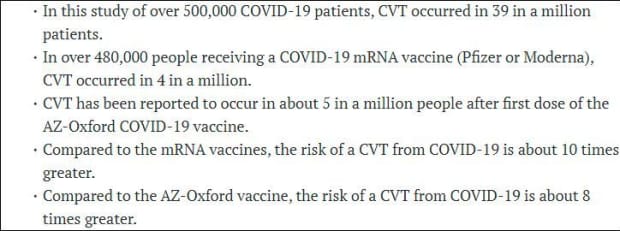This post was originally published on this site
A new study from researchers at Oxford University has found that people who contract COVID-19 are at far higher risk of developing blood clots than people who receive COVID-19 vaccines, further bolstering the case for vaccine use.
The study, which was published in preprint form on Thursday, meaning it has not yet been peer-reviewed, found the risk of cerebral venous thrombosis, or CVT, after a COVID-19 infection is about 100 times greater than normal, and several times higher than after coronavirus vaccination or after the flu.
Researchers, led by Professor Paul Harrison and Dr. Maxime Taquet from Oxford University’s Department of Psychiatry and the NIHR Oxford Health Biomedical Research Centre, studied the number of CVT cases diagnosed in the two weeks after someone tests positive for COVID-19, or two weeks after the first dose of a vaccine. They then compared those numbers to the incidents of CVT diagnosed when someone is sick with the flu, and the background level in the general population.
The researchers found that CVT incidence is more common after COVID-19 than in any of the comparison groups, and about eight to 10 times higher in people who have received COVID-19 vaccines, namely the two mRNA vaccines developed by Pfizer Inc.
PFE,
and German partner BioNTech SE
BNTX,
and by Moderna Inc.
MRNA,
or the adenovirus viral vector-based vaccine developed by AstraZeneca PLC
AZN,
AZN,
and Oxford University. A full 30% of the CVT cases detected occurred in people below the age of 30 who were infected with COVID.
The breakdown is as follows:

The data must be interpreted cautiously, the authors wrote, as it is still being compiled.
‘We’ve reached two important conclusions,” said Harrison. “Firstly, COVID-19 markedly increases the risk of CVT, adding to the list of blood clotting problems this infection causes. Secondly, the COVID-19 risk is higher than we see with the current vaccines, even for those under 30; something that should be taken into account when considering the balances between risks and benefits for vaccination.”
The study comes amid growing scrutiny of the AstraZeneca vaccine and its link to rare but serious blood clots, and after U.S. regulators recommended a pause on using the vaccine developed by Johnson & Johnson, also an adenovirus viral vector-based vaccine, after six women were hospitalized with a rare type of blood clot. That number is also very small, compared with the 6.8 million people who had received the vaccine.
The European Medicines Agency said recently it has found a link between clotting cases and the AstraZeneca vaccine, although it stressed the issue remains very rare. On Wednesday, Denmark became the first country to fully discontinue use of the AstraZeneca jab.
Read also: Rare blood-clotting issue dominates COVID news as Denmark scraps AstraZeneca vaccine
The Centers for Disease Control and Prevention’s advisory committee held an emergency meeting on Wednesday to discuss data from J&J’s vaccine and opted to maintain the pause to further explore the issue.
See: Johnson & Johnson vaccine pause: What to know if you got or scheduled the shot
In the case of the J&J vaccine, the blood clots occurred as a result of cerebral venous sinus thrombosis in combination with thrombocytopenia, a condition that causes low levels of blood platelets.
“While causality has not been fully established between these very rare events and our vaccine, we recognize these events could represent an important potential risk with the Janssen vaccine,” Dr. Aran Maree, chief medical officer for J&J’s drugs business, said during the meeting.
The committee will reconvene at a date expected to be revealed on Friday.
MANY medical experts continue to believe the benefits of the vaccines far outweigh the risks of contracting COVID-19, which can come with a long line of serious side effects.
“COVID-19 vaccines are effective and are a critical tool to bring the pandemic under control,” said CDC spokesperson Kristin Nordlund. “All of the available vaccines have been proven effective at preventing severe illness, hospitalizations, and deaths.”
The CDC was commenting on the small number of cases of breakthrough infections of COVID-19 that have occurred even among people who have been fully vaccinated. So far, the agency has counted just 5,800 cases of breakthrough infections out of roughly 124 million Americans that have received a first dose. These cases are to be expected given the vaccines are not 100% effective in preventing infections, and serve as a reminder that people need to continue to comply with safety measures after vaccination, meaning frequent hand washing, socially distancing and wearing face masks in public.

